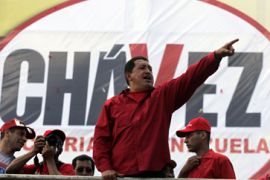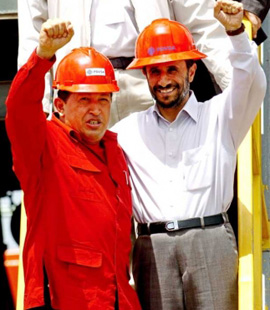Fuelling the Chavez revolution
Venezuela’s oil boom gives its president unprecedented international influence.

 |
| Chavez (L) has built good relations with Iran |
As Venezuela experiences one of its biggest oil booms ever, the flow of “black gold” has breathed new life into the national economy and brought unprecedented political influence and power to the country’s president, Hugo Chavez.
Consequently, the state oil company Petroleos de Venezuela (PDVSA) and its 20,000 employees are regarded as a national institution by Chavez. The PDVSA will boost the country’s coffers by $50bn in just 2006 alone.
Venezuela is the world’s fifth biggest oil exporter, with proven crude oil reserves of 80 billion barrels.
As he campaigns for re-election in December, Chavez has continued with his strident anti-US rhetoric.
“If the North American empire and it’s lackeys attempt another coup, or don’t acknowledge the electoral outcome, we will not send them one more drop of oil,” he said recently.
Business partners
|
f the North American empire and it’s lackeys attempt another coup, or don’t acknowledge the electoral outcome, we will not send them one more drop of oil |
It is a threat that has been made many times before, yet business between the US and Venezuela is as solid as ever.
The oil is shipped out north, the cash keeps coming in and Chavez’s power continues to grow.
The commercial relationship with the US is one of strategic importance to the Venezuelan economy according to Jose Suarez Nunez, an oil analyst.
“The oil money comes in every 30 days and it’s cash. Venezuela’s industry is, in large part, paralysed,” he says.
“We import twenty to thirty billion dollars worth of products from the United States every year.”
The US is Venezuela’s strongest commercial partner but not its only one. Oil money has strengthened Venezuela’s ties with countries around the globe.
For example, Chavez will build a tractor factory in Iran while another deal will see Russian Kalashnikov rifles being manufactured in Venezuela.
Oil has increased Chavez’s influence in the regional political arena. Roughly 10 per cent of Venezuela’s oil is either sold at reduced prices or exchanged for goods and services with some Latin American countries.
Sharing the wealth
An important partner is Cuba, which gets 93,000 barrels of oil each day. In exchange, 20,000 Cuban doctors work in Venezuela.
Chavez’s policy is to slowly reduce Venezuelan dependence on the US market and give impetus to a regional common market.
Elio Ohep, editor of the internet magazine Petroleum World, said: “You are taking some barrels from the US and you are giving to poorer countries in the Caribbean and even fuel oil to poor Americans. That is perfectly good from the point of view of his policy.”
Rivals who opposed Chavez in the recent presidential election say he is buying allies, but the president says sharing the oil wealth is providing aid to countries in need.
At home it is financing infrastructure projects and social programs as well as subsidising food, housing and jobs. But health care and education are a matter of pride for Chavez.
Personal benefits
He says in the last three years there have been more than 208 million doctors’ visits.
“We have saved 36,490 lives,” he has claimed. “Those people would already have been dead and buried if they hadn’t had a doctor close by.”
The programmes have been costly, but while the oil price stays over $50-per-barrel, Venezuelans will continue to benefit from subsidies, especially at the pump. On average they pay just over two dollars to fill up their tanks.
“It is a birthright of all Venezuelans because the oil, after all, belongs to us,” says Victor Acosta, a salesman in Caracas.
It may belong to all, but Hugo Chavez has said PDVSA is mainly at the service of his Bolivarian revolution and to the majority of his supporters, it is the country’s life blood.